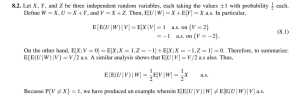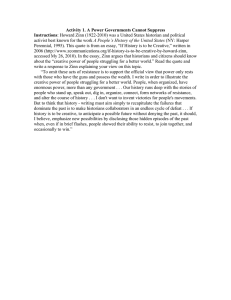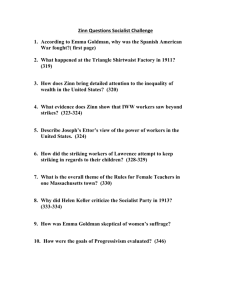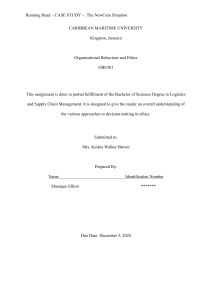March 3
advertisement
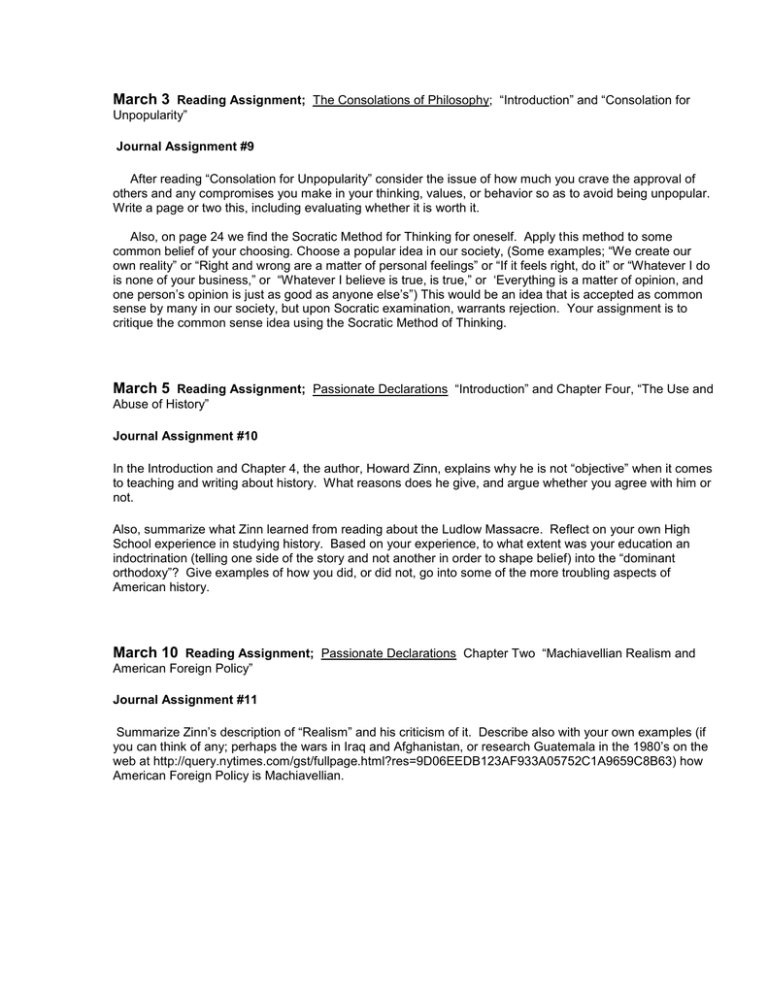
March 3 Reading Assignment; The Consolations of Philosophy; “Introduction” and “Consolation for Unpopularity” Journal Assignment #9 After reading “Consolation for Unpopularity” consider the issue of how much you crave the approval of others and any compromises you make in your thinking, values, or behavior so as to avoid being unpopular. Write a page or two this, including evaluating whether it is worth it. Also, on page 24 we find the Socratic Method for Thinking for oneself. Apply this method to some common belief of your choosing. Choose a popular idea in our society, (Some examples; “We create our own reality” or “Right and wrong are a matter of personal feelings” or “If it feels right, do it” or “Whatever I do is none of your business,” or “Whatever I believe is true, is true,” or ‘Everything is a matter of opinion, and one person’s opinion is just as good as anyone else’s”) This would be an idea that is accepted as common sense by many in our society, but upon Socratic examination, warrants rejection. Your assignment is to critique the common sense idea using the Socratic Method of Thinking. March 5 Reading Assignment; Passionate Declarations “Introduction” and Chapter Four, “The Use and Abuse of History” Journal Assignment #10 In the Introduction and Chapter 4, the author, Howard Zinn, explains why he is not “objective” when it comes to teaching and writing about history. What reasons does he give, and argue whether you agree with him or not. Also, summarize what Zinn learned from reading about the Ludlow Massacre. Reflect on your own High School experience in studying history. Based on your experience, to what extent was your education an indoctrination (telling one side of the story and not another in order to shape belief) into the “dominant orthodoxy”? Give examples of how you did, or did not, go into some of the more troubling aspects of American history. March 10 Reading Assignment; Passionate Declarations Chapter Two “Machiavellian Realism and American Foreign Policy” Journal Assignment #11 Summarize Zinn’s description of “Realism” and his criticism of it. Describe also with your own examples (if you can think of any; perhaps the wars in Iraq and Afghanistan, or research Guatemala in the 1980’s on the web at http://query.nytimes.com/gst/fullpage.html?res=9D06EEDB123AF933A05752C1A9659C8B63) how American Foreign Policy is Machiavellian. March 12 Reading Assignment; The Consolations of Philosophy; “Consolation for Not Having Enough Money” Journal Assignment #12 Summarize the position Epicurus takes on what truly makes people happy. Do you agree or not? Contrast his ideas with what modern American society puts forth as “The Good Life,” Consider your own beliefs and behavior on the subject of happiness. What would make a happy life for you? What do you think Epicurus would say about your program for happiness? What could you be doing now to insure a happy life in the future? March 19 Reading Assignment; Research Utilitarianism, the ethical/political philosophy of “The Greatest Good for the Greatest Number (or The Least Harm for the Fewest) on the Wikipedia website; http://en.wikipedia.org/wiki/Utilitarianism Read the sections from “History” to “Negative” as well as the sections on “Predicting Consequences,” “Importance of Intentions,” and “Human Rights”. Journal Assignment #13 Describe the Utilitarian approach to moral decision making. What are some of the criticisms of Utilitarianism? How would a Utilitarian approach the issue of drafting young men to fight in a war of selfdefense? How would a Utilitarian approach the problem of harvesting the organs (heart, lungs, kidneys, liver, etc) of a seriously deformed and mentally disabled baby to give them to save the lives of 4 other sick babies? Hand in Journal Assignments #6 through #13 for grading. SPRING BREAK – NO CLASSES MARCH 24 AND 26
